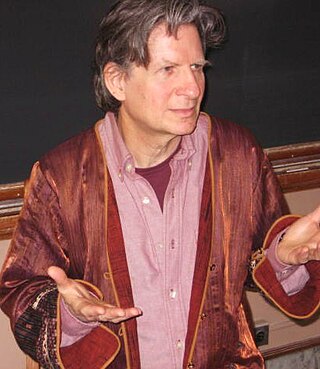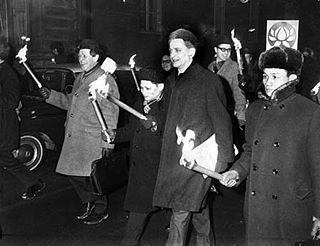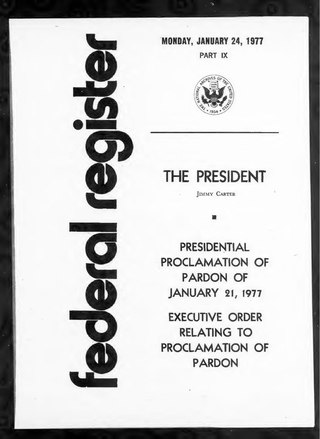
Conscription evasion or draft evasion is any successful attempt to elude a government-imposed obligation to serve in the military forces of one's nation. Sometimes draft evasion involves refusing to comply with the military draft laws of one's nation. Illegal draft evasion is said to have characterized every military conflict of the 20th and 21st centuries, in which at least one party of such conflict has enforced conscription. Such evasion is generally considered to be a criminal offense, and laws against it go back thousands of years.

Mark Ivor Satin is an American political theorist, writer, and newsletter publisher. He is best known for contributing to the development and dissemination of three political perspectives – neopacifism in the 1960s, New Age politics in the 1970s and 1980s, and radical centrism in the 1990s and 2000s. Satin's work is sometimes seen as building toward a new political ideology, and then it is often labeled "transformational", "post-liberal", or "post-Marxist". One historian calls Satin's writing "post-hip".

Desertion is the abandonment of a military duty or post without permission and is done with the intention of not returning. This contrasts with unauthorized absence (UA) or absence without leave, which are temporary forms of absence.
Canada did not officially participate in the Vietnam War. However, it contributed to peacekeeping forces in 1973 to help enforce the Paris Peace Accords.

In the United States of America, military conscription, commonly known as the draft, has been employed by the U.S. federal government in six conflicts: the American Revolutionary War, the American Civil War, World War I, World War II, the Korean War, and the Vietnam War. The fourth incarnation of the draft came into being in 1940, through the Selective Training and Service Act; this was the country's first peacetime draft. From 1940 until 1973, during both peacetime and periods of conflict, men were drafted to fill vacancies in the U.S. Armed Forces that could not be filled through voluntary means. Active conscription in the United States ended in 1973, when the U.S. Armed Forces moved to an all-volunteer military. However, conscription remains in place on a contingency basis; all male U.S. citizens, regardless of where they live, and male immigrants, whether documented or undocumented, residing within the United States, who are 18 through 25 are required to register with the Selective Service System. United States federal law also continues to provide for the compulsory conscription of men between the ages of 17 and 44 who are, or who have made a declaration of intention to become, U.S. citizens, and additionally women in certain health care occupations, for militia service pursuant to Article I, Section 8 of the United States Constitution and 10 U.S. Code § 246.

Jeremy Dean Hinzman is an Iraq War resister who was the first American deserter to seek refugee status in Canada.

The War Resisters Support Campaign (WRSC) is a Canadian non-profit community organization, founded in April 2004 in Toronto, Ontario to mobilize support among Canadians and worldwide to convince the Canadian government to offer sanctuary to all U.S. military personnel who wish to come to Canada because of their opposition to the invasion and occupation of Iraq.
Jeffry A. House is a retired lawyer who practiced in Toronto, Ontario, Canada. He is best known for his efforts on behalf and representation of fugitive American soldiers and Indigenous protesters.
Amnesty is defined as "A pardon extended by the government to a group or class of people, usually for a political offense; the act of a sovereign power officially forgiving certain classes of people who are subject to trial but have not yet been convicted." Though the term general pardon has a similar definition, an amnesty constitutes more than a pardon, in so much as it obliterates all legal remembrance of the offense. Amnesty is increasingly used to express the idea of "freedom" and to refer to when prisoners can go free.
Robin Long is one of several U.S. Army deserters who sought asylum in Canada because of his opposition to the Iraq War and became the first of those to be deported to the United States after being rejected for refugee status. He was deported from Canada on July 15, 2008.

During the Iraq War, which began with the 2003 invasion of Iraq, there were United States military personnel who refused to participate, or continue to participate, in that specific war. Their refusal meant that they faced the possibility of punishment in the United States according to Article 85 of the US Uniform Code of Military Justice. For that reason some of them chose to go to Canada as a place of refuge. The choice of these US Iraq War resisters to go to Canada has led to considerable debate in Canada's society, press, legal arenas, and political arenas. Much of the debate on this issue has been due to the controversial nature of the Iraq War itself. Among the many elements of that debate are Canada's relationship to the Iraq War, and Canada's relationship to the US, its largest trading partner.

A war resister is a person who resists war. The term can mean several things: resisting participation in all war, or a specific war, either before or after enlisting in, being inducted into, or being conscripted into a military force.
Kimberly Rivera is an Iraq War resister and former U.S. Army Private First Class who went AWOL in February 2007 after a year of service. She was the first female U.S. military deserter to flee to Canada. She was deported from Canada on September 20, 2012, and pleaded guilty to desertion, receiving a sentence of ten months' imprisonment and a bad-conduct discharge. Amnesty International objected to her detention and designated her a prisoner of conscience.

Draft evasion in the Vietnam War was a common practice in the United States and in Australia. Significant draft avoidance was taking place even before the United States became heavily involved in the Vietnam War. The large cohort of Baby Boomers allowed for a steep increase in the number of exemptions and deferments, especially for college and graduate students. More than half of the 27 million men eligible for the draft during the Vietnam War were deferred, exempted or disqualified.

American immigration to Canada was a notable part of the social history of Canada. Over Canada's history various refugees and economic migrants from the United States would immigrate to Canada for a variety of reasons. Exiled Loyalists from the United States first came, followed by African-American refugees, economic migrants, and later draft evaders from the Vietnam War.

Vietnam War resisters in Sweden were Americans who fled to Sweden to avoid service in the Vietnam War between 1967 and 1973. Among the roughly 1,000 American exiles were around 800 military deserters and draft dodgers. Unlike other nations like Canada that discreetly harbored Vietnam War resisters, the Swedish government granted war resisters asylum status and the public openly welcomed them. This unique acceptance and Swedish politicians' open protests against American involvement in the Vietnam War caused a rift in relations between the United States and Sweden.

Terry Marvell Whitmore was an American soldier, deserter and actor.

Proclamation 4483, also known as the Granting Pardon for Violations of the Selective Service Act, was a presidential proclamation issued by Jimmy Carter on January 21, 1977. It granted pardons to those who evaded the draft in the Vietnam War by violating the Military Selective Service Act from August 4, 1964, to March 28, 1973. It was implemented through Executive Order 11967.

The Intrepid Four were a group of United States Navy sailors who grew to oppose what they called "the American aggression in Vietnam" and publicly deserted from the USS Intrepid in October 1967 as it docked in Japan during the Vietnam War. They were among the first American troops whose desertion was publicly announced during the war and the first within the U.S. Navy. The fact that it was a group, and not just an individual, made it more newsworthy.












